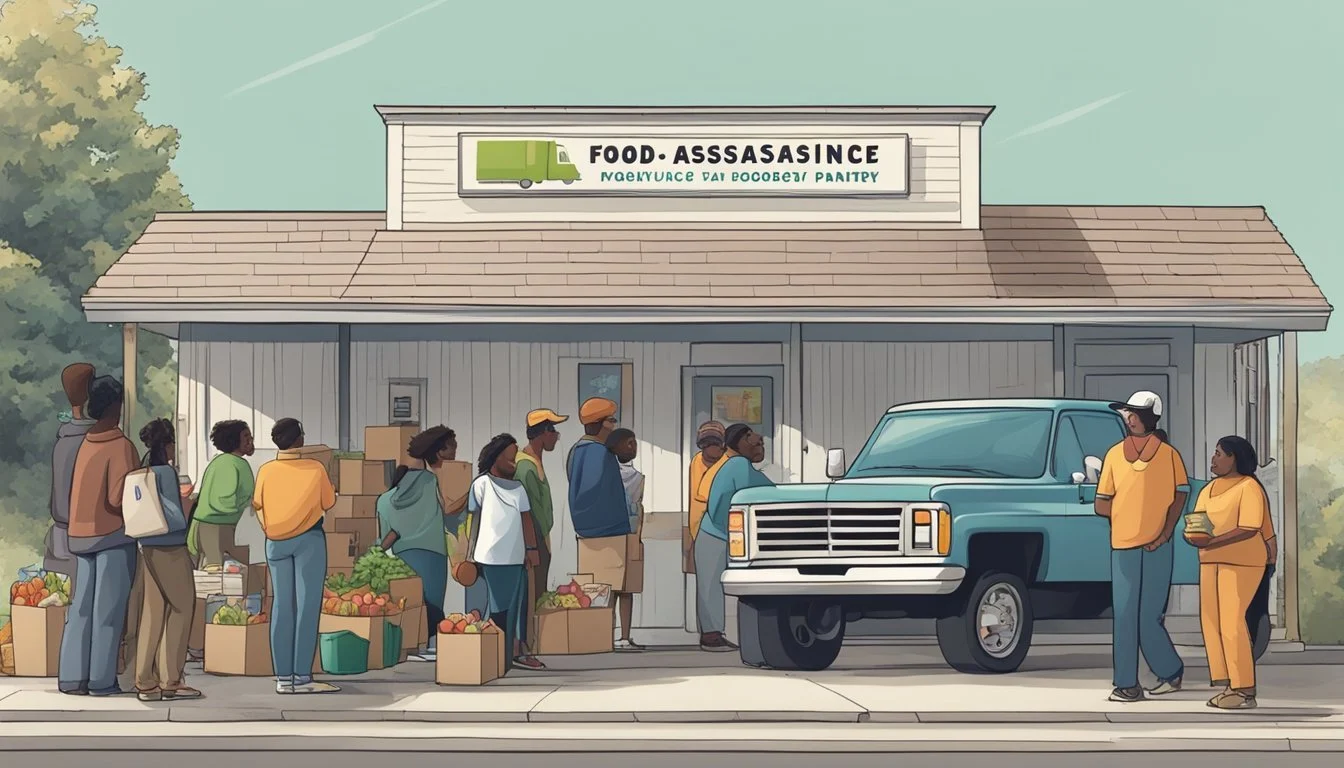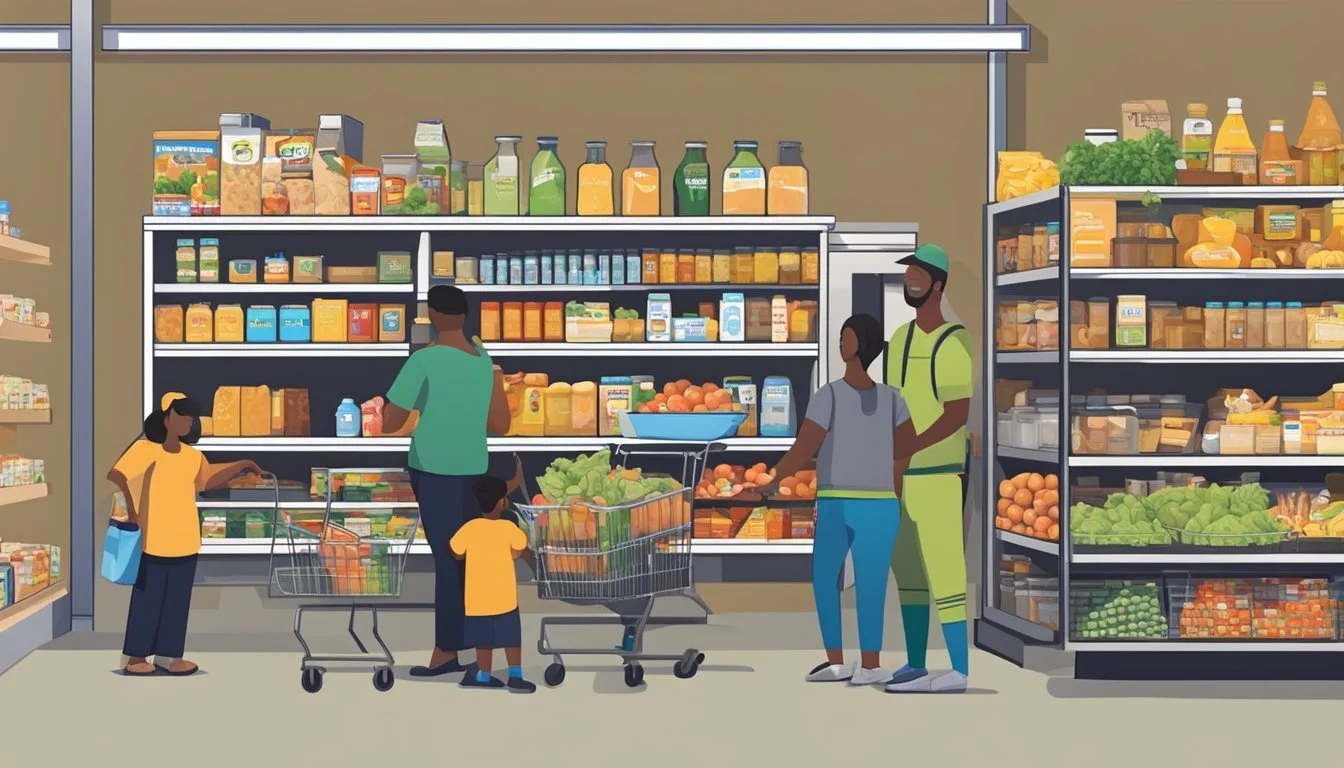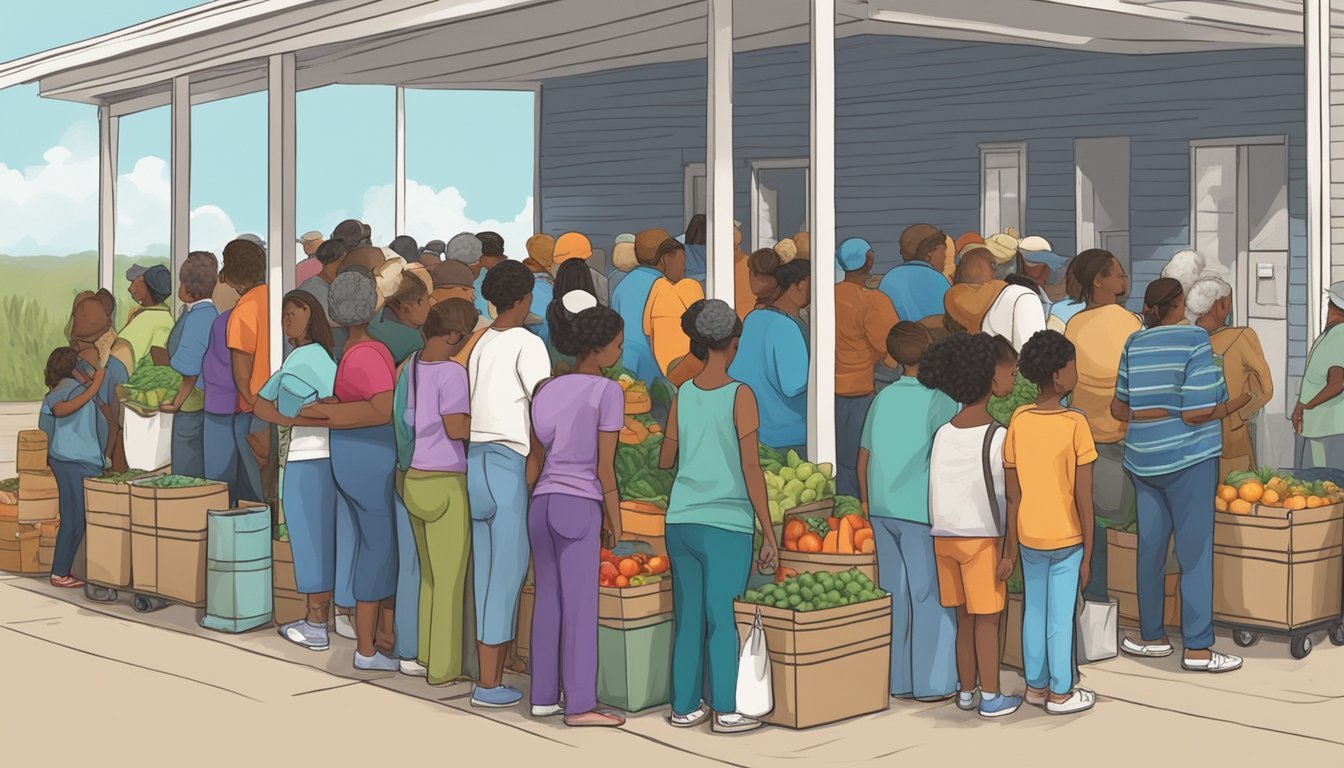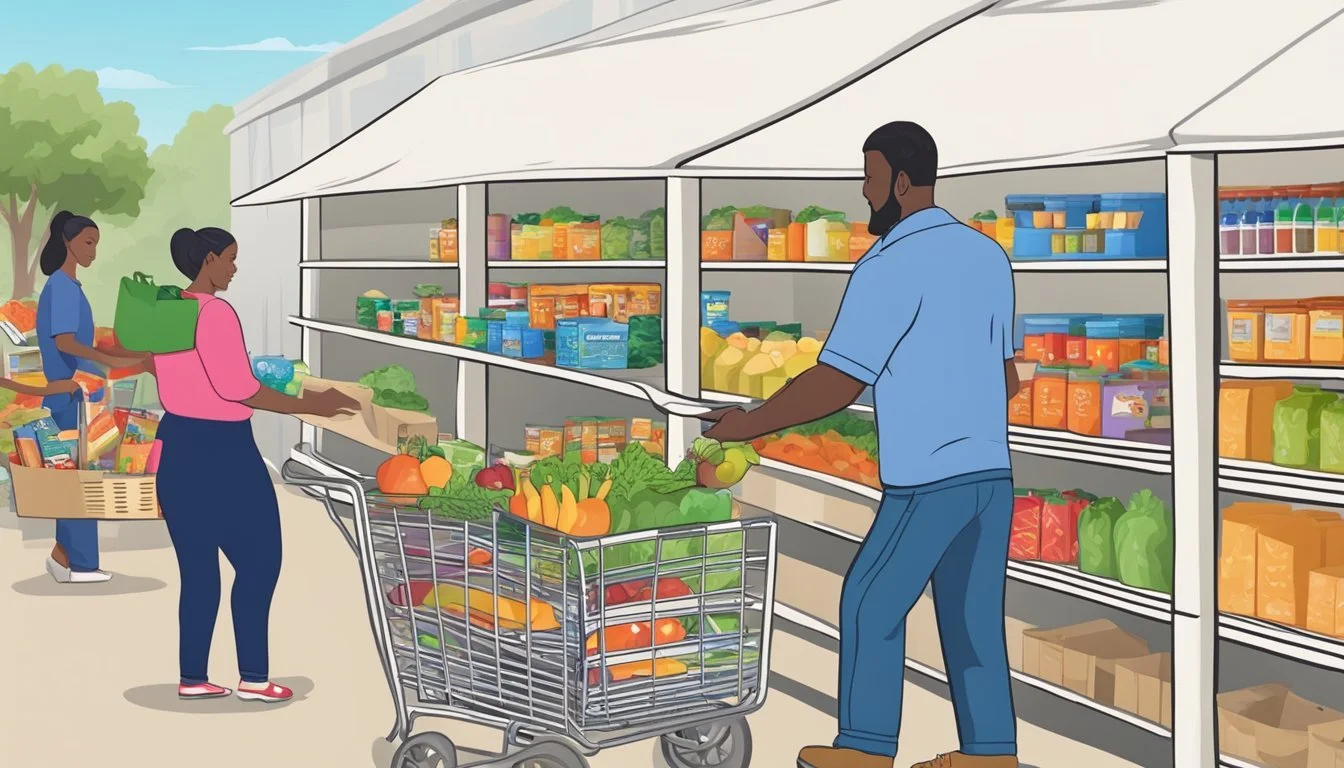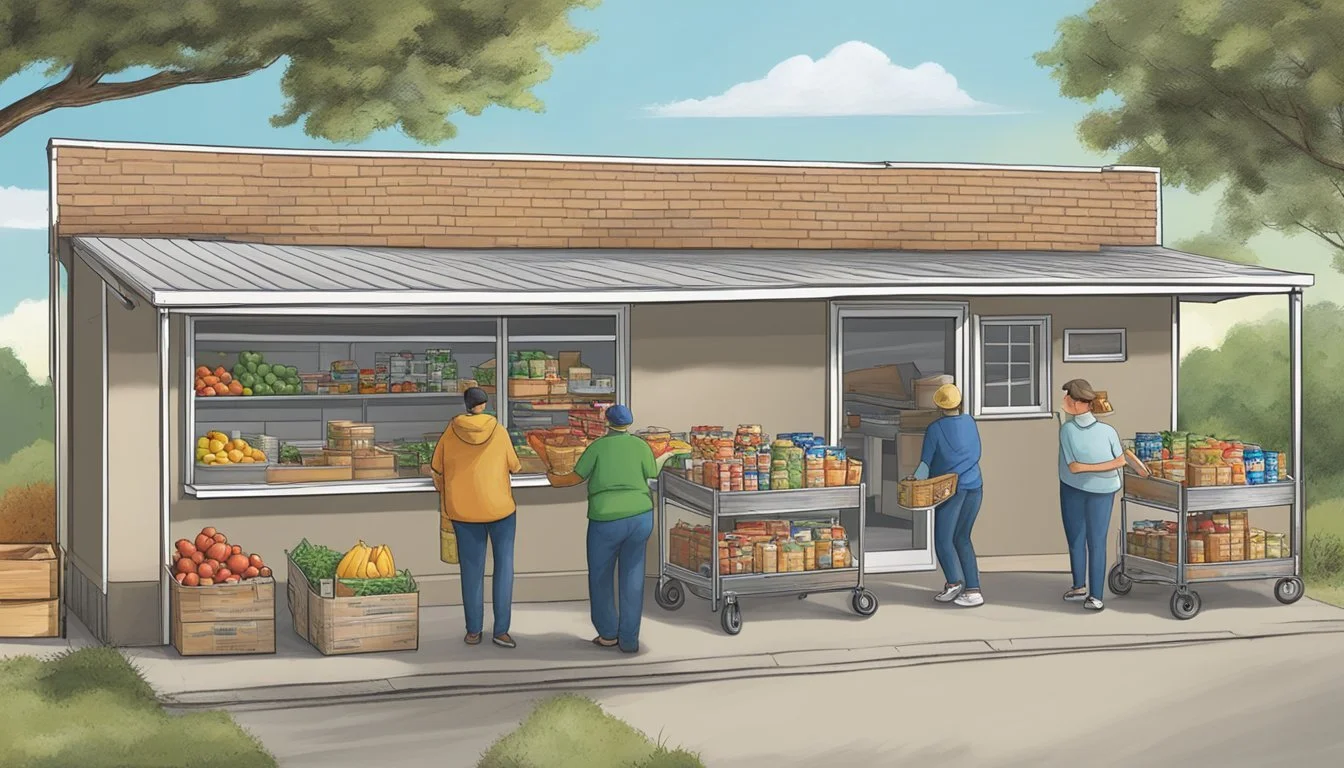Free Groceries and Food Pantries in Kimble County, Texas
Your Guide to Accessing Assistance
This Article is Part of Our Guide on Free Groceries in Texas
In Kimble County, Texas, residents facing food insecurity have access to crucial resources that provide free groceries and food assistance. Community efforts and charitable organizations have established food banks and pantries that offer a range of food items to those in need. These services cater to low-income families, immigrants, and the unemployed, ensuring that individuals and households can access nutritious foods, including produce, dairy products, meats, and other essentials.
Local food banks, often part of the Feeding America network, serve as lifelines, connecting people with various federal programs and local services aimed at easing the burden of food acquisition. The support extends beyond the mere provision of food, with guidance available for applying for assistance programs such as SNAP (Supplemental Nutrition Assistance Program). In response to changing federal policies and the lasting impacts of the COVID-19 public health emergency, these organizations adapt to continue meeting the community's needs efficiently.
Moreover, innovative approaches like drive-thru pantries in the region exemplify convenience by allowing individuals to receive groceries without leaving their vehicles, thereby maintaining personal comfort and adhering to any existing public health recommendations. These services underscore the community's commitment to accessibility and support, ensuring that residents of Kimble County can find the help they need close to home.
Understanding Food Insecurity in Kimble County
Food insecurity is a pressing issue in Kimble County, Texas, where limited access to nutritious food affects the well-being of the community. The residents rely heavily on local food pantries and food banks to supplement their dietary needs.
The Role of Food Pantries and Food Banks
Food pantries and food banks in Kimble County serve as crucial resources for individuals and families facing food insecurity. Food pantries provide immediate food assistance, typically supplying several days' worth of groceries to those in need. These pantries can be standalone establishments or part of existing community organizations.
Food Bank Support: The Food Bank acts as a central hub, distributing large quantities of food to affiliated pantries. It collects donations, organizes food drives, and works with local businesses to secure a steady supply of food items.
Impact of Free Food Distribution on Communities
The distribution of free food through various programs has a significant impact on Kimble County's communities. The presence of food pantries and other food assistance services helps to:
Mitigate Hunger: Ensure that no individual goes hungry, especially children, the elderly, and the most vulnerable groups.
Improve Health Outcomes: Provide balanced nutrition that is essential for health and well-being.
by preventing malnutrition and contributing to better overall health, these services support the community's foundation.
Locating Food Assistance
Finding free groceries and food pantries in Kimble County, Texas, involves understanding the network of available food banks, mobile pantry programs, and partner agencies. Residents in this area can access food assistance by using their zip code to locate nearby services, attending mobile pantry distributions, and connecting with local agencies offering aid.
Food Banks and Pantries by Zip Code
Individuals seeking food assistance in Kimble County can begin their search by locating food banks and pantries using their zip code. For example, residents can reach out to the Kimble County Senior Center, known to assist community members in need. Here is the information for that specific location:
Location: Kimble County Senior Center
Address: 404 College Street, Junction, TX - 76849
Contact: (325) 446-3621
Mobile Pantry Programs
Mobile pantry programs are integral to reaching individuals in need throughout Kimble County. These programs often provide a range of nutritious food items, allowing residents to receive assistance in convenient locations. For accurate dates, times, and locations of mobile pantry distributions, contacting partner organizations such as Feeding America or local food banks will provide the most current schedules.
Partner Agencies in the Area
Partner agencies across Kimble County collaborate with food banks to distribute food to those in need. In areas like Jefferson County, food assistance programs such as the Market to H.O.P.E. offer curbside distribution, making it accessible to many residents. Details for this program include:
Schedule: Tuesdays 3:00 pm - 6:00 pm, Saturdays 9:00 am - 12:00 pm
Location: 3370 Sarah Street Beaumont TX 77705
Contact: (409) 924-4435
Residents should reach out directly to these agencies to receive location-specific details and confirm the availability of food assistance services.
Operating Hours and Schedules
When looking for free groceries or visiting food pantries in Kimble County, Texas, it's essential to be aware of their operating hours and schedules. Each food pantry may vary in the times and days they are open to serve the community. Here's what visitors need to know:
Typical Operating Hours:
Most food pantries operate during weekday business hours, with some offering weekend services.
Standard hours could be 8:00 AM to 5:00 PM, Monday through Friday.
Special Schedules:
Pantries might adjust hours based on need, holidays, or severe weather conditions, aligning possibly with school district closures for weather-related events.
Clients should check for any special notices regarding holiday closures or changes in regular schedules.
First-time Visitors:
New clients are usually encouraged to arrive well before the end time to ensure they can be accommodated. For example, they might need to arrive at least 15 minutes before the closing time.
Distribution Days:
Pantries may have specific distribution days, such as once a week or once a month.
Mobile food banks may visit different locations on a set schedule, making stops throughout the county on assigned days.
Remember:
For the most current information, visitors should directly contact the food pantry or check the pantry's official website before planning their visit.
Note: Always verify the operating hours for the specific day you plan to visit, as these can be subject to change without prior notice.
Eligibility and Requirements for Aid
In Kimble County, Texas, access to free groceries and food assistance is available through several programs. These programs have specific eligibility criteria centered around income levels, household composition, and nutritional needs.
Qualifying for SNAP Benefits
The Supplemental Nutrition Assistance Program (SNAP), formerly known as food stamps, offers financial aid to purchase groceries for low-income individuals and families. To qualify for SNAP benefits in Kimble County, applicants must meet certain income thresholds. These thresholds are based on the Federal Poverty Level and vary by household size.
For a household of one: the maximum gross monthly income is 130% of the Federal Poverty Level.
For larger households: the limit increases by a set amount for each additional member.
Applicants must also pass asset tests and provide proof of local residency and citizenship or legal noncitizen status.
WIC Program Participation
The Women, Infants, and Children (WIC) program focuses on the nutritional needs of pregnant women, breastfeeding mothers, infants, and children up to age five. Eligibility for WIC is determined by:
Income: Must be at or below 185% of the Federal Poverty Level.
Assessment: A nutritional risk assessment conducted by a health professional at a WIC clinic.
Participants receive benefits to purchase specific nutrient-rich foods, which contribute to the health of mothers and their children.
Low-Income Assistance Programs
Low-income families and individuals in Kimble County may also benefit from a variety of assistance programs. These programs are often operated by local food banks and pantries, which collaborate with federal programs like The Emergency Food Assistance Program (TEFAP).
Income eligibility: Extends to those with incomes at or below 150% of the Federal Poverty Level, although this can vary by the specific program's guidelines.
Documentation: Proof of income, residency, and a valid I.D. may be required to obtain aid.
Food pantries may distribute food directly or through various community initiatives, such as drive-through pantries or soup kitchens.
Getting Involved
In Kimble County, community participation greatly enhances the effectiveness of food assistance programs. Volunteers serve as the backbone of food distributions, while donations from local residents bolster the drive-thru pantry's resources.
Volunteering Opportunities
Individuals looking to volunteer can play a significant role in local food banks. They are essential for various tasks, such as assisting with food sorting, aiding the drive-thru pantry operations, and offering direct support during food distributions. For those interested, contacting the nearest food bank in Kimble County to learn about specific volunteer opportunities is recommended.
Organizing Food Drives
Local organizations, schools, and businesses can contribute by organizing food drives. These initiatives collect non-perishable groceries that can be distributed to those in need. Organizers can coordinate with food banks to ensure a smooth and successful drive, following guidelines to meet the community's specific dietary preferences and needs.
Donating Groceries and Funds
Monetary contributions provide food banks with the flexibility to address immediate needs and purchase fresh groceries. Donating funds is also critical for sustaining the operations of drive-thru pantries. Individuals wishing to donate groceries can consult food banks to understand the most in-demand items and contribute accordingly.
Nutritional Education and Resources
In Kimble County, Texas, residents have access to valuable nutritional education and resources that aid in securing not just food, but healthy food choices. These resources provide support to individuals and families who require assistance in understanding nutritional needs and making informed decisions.
The Supplemental Nutrition Assistance Program (SNAP) stands as a cornerstone in the fight against hunger. SNAP offers nutritional assistance to millions of eligible, low-income individuals and families. The program facilitates access to nutritious food by providing financial assistance that can be used at participating grocery stores and farmers markets.
Organizations within the county often collaborate with SNAP-Ed, the educational component of SNAP, to deliver nutrition education. This program teaches the foundations of healthy eating, budget-friendly shopping, and preparation of nutritious meals. Community initiatives may include:
Hands-on cooking classes
Grocery store tours that focus on making healthy choices
Workshops on budgeting and meal planning
Below is an insight into resources available in Kimble County that focus on nutrition education:
Program Services Offered Contact Information SNAP-Ed Nutrition Education, Healthy Recipes Local SNAP Offices Local Food Banks Food Assistance, Nutrition Guides Through Central Texas Food Bank Community Health Centers Dietician Consultations, Health Screenings Local Health Department
Additionally, many local food pantries not only provide free groceries but may also offer educational materials and access to nutrition experts for guidance on dietary needs. These services help ensure that residents not only receive food but also the knowledge to make healthier food choices.
Outreach and Community Programs
In Kimble County, Texas, efforts to combat food insecurity involve educational outreach and interactive community programs. These initiatives aim to empower residents with the knowledge and skills necessary to manage their nutritional needs effectively and economically.
Cooking and Budgeting Workshops
Cooking and Budgeting Workshops are held regularly by local food assistance organizations in Kimble County. Participants learn how to prepare healthy meals while adhering to a budget, making nutritious eating more accessible and affordable. These workshops typically address:
Meal Planning: Strategies for creating meal plans that minimize waste and cost.
Smart Shopping: Tips for purchasing ingredients that are both economical and nutritious.
Cooking Techniques: Basic cooking methods to maximize flavor without compromising health.
Community Gardens and Nutrition Classes
Community Gardens in Kimble County foster a sense of unity while providing fresh produce to those involved. They operate with the dual goal of enhancing food security and strengthening community bonds. State and local entities often support these gardens, appreciating their role in:
Local Food Production: Encouraging communities to cultivate their own fruits and vegetables.
Educational Opportunities: Hosting nutrition classes on-site to inform about the benefits of whole foods and proper diet.
Each garden hosts events and classes, ensuring sustainable consumption practices and promoting a healthy lifestyle among local residents.
Regional and National Support Networks
Individuals in Kimble County, Texas can find substantial support through a network of regional and national organizations dedicated to providing free food and groceries. These associations work collaboratively to ensure that no one goes hungry and that access to nutritious food is available to all who need it.
Associations With Feeding America
Feeding America is a nationwide network of more than 200 food banks that reaches communities across the country, including Texas. It supports local food banks that connect people with food pantries, soup kitchens, and drive-thru pantries. In Texas, organizations such as the Central Texas Food Bank, Houston Food Bank, and North Texas Food Bank are part of the Feeding America network. These food banks collectively distribute millions of meals to Texans every year through their extensive network of pantries and distribution programs.
Central Texas Food Bank: Covers a 21-county area in Central Texas, offering programs that increase food security.
Houston Food Bank: Operates as a source of food for hunger relief in Southeast Texas.
North Texas Food Bank: Provides access to more than 190,000 meals each day across 13 counties in North Texas.
Support From State Food Bank Networks
Texas Food Bank Network is a collaborative system of food banks across the state that provide resources and support in applying for nutrition assistance programs like SNAP (Supplemental Nutrition Assistance Program). The network's prevalent presence ensures that residents of Kimble County have nearby access to assistance. State food banks work closely with county agencies and local nonprofits to deliver a coordinated response to hunger and food insecurity in the region.
Available assistance includes:
SNAP application help
Food pantry locations
Nutritious food distribution events
These networks not only focus on immediate food assistance but also advocate for long-term solutions to combat hunger and support community resilience.
Challenges and Future Directions
In Kimble County, Texas, food pantries are a vital resource for individuals and families combating food insecurity. Despite their importance, these pantries face numerous challenges.
Logistical Hurdles: Distribution of fresh, nutritious food requires efficient coordination, storage, and transportation. The COVID-19 pandemic laid bare these issues, shrinking volunteer pools and disrupting supply chains.
Limited storage capacity for perishables
Inconsistent supply of fresh foods
Broadening geographic service areas amidst transportation issues
Access and Awareness: Ensuring the community knows about and can access these services is paramount. Food pantries must navigate:
Improved communication strategies
Outreach to inform potential clients about services and Food Stamps eligibility
Reduction of barriers to service for rural and marginalized residents
Enhancing Support: Food pantries like the El Pasoans Fighting Hunger Food Bank seek to strengthen local responses to hunger. Solutions under consideration include:
Collaborations with local farms and retailers
Development of mentorship programs for better food management
Educational initiatives to inform recipients about nutritious food choices
Future directions involve fortifying networks across Kimble County to guarantee a robust, scalable response to food insecurity. Underpinning these efforts with strong partnerships and community support is critical. Innovations in service models, such as drive-thru pantries, present promising venues to increase the reach and efficacy of food assistance programs.



